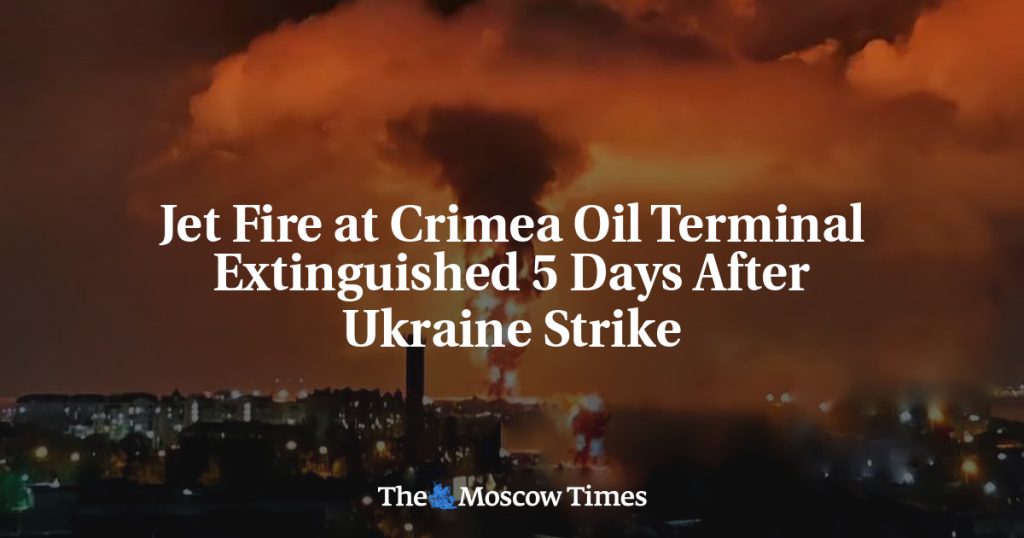A jet fire at an oil terminal in Feodosia, a port city in Russian-annexed Crimea, has been extinguished after five days. Ukrainian missile strikes were reported as the cause of the fire, prompting more than 1,100 people to be evacuated as the flames spread across 2,500 square meters. Mayor Igor Tkachenko reassured residents that the situation was under control and emergency recovery work was ongoing. However, reports of nausea, headaches, and coughing from locals led to concerns about air quality, with the local consumer protection watchdog identifying high levels of sulfur dioxide near the flames.
The oil terminal in Feodosia was linked to President Vladimir Putin’s university friend Viktor Khmarin, who was reportedly the beneficiary of a company that purchased the terminal in 2019 after it was nationalized by Russia’s occupational authorities. The terminal is considered the largest on the Crimean peninsula in the Black Sea. The incident highlights the ongoing tensions between Russia and Ukraine, particularly after Russia annexed Crimea from Ukraine in 2014. The missile strike and resulting fire further underscore the volatile situation in the region and the impact on local residents and infrastructure.
The news of the oil terminal fire comes amid increasing challenges faced by independent journalists in Russia. The Moscow Times, a prominent news outlet, has been targeted by Russia’s authorities, facing accusations of discrediting the decisions of the Russian leadership. Despite these challenges, the journalists at The Moscow Times remain committed to providing accurate and unbiased reporting on Russia. They emphasize the importance of defending open, independent journalism in the face of repression and seek support from their readers to continue their work.
Local authorities in Feodosia, led by Mayor Tkachenko, worked to stabilize the situation and ensure that the fire at the oil terminal was fully extinguished. Emergency recovery efforts were ongoing to address any remaining issues and to minimize the impact on residents and the environment. Tkachenko’s updates on the situation aimed to reassure the public and provide information on the progress of the recovery work. The incident serves as a reminder of the potential risks and consequences associated with industrial accidents and geopolitical tensions in the region.
The aftermath of the oil terminal fire in Feodosia raised concerns about air quality and the impact of the incident on local residents. Reports of health issues such as nausea, headaches, and coughing among locals prompted further investigations into the air quality in the area. The presence of high levels of sulfur dioxide near the flames added to the worries about potential health risks. Local authorities, along with the consumer protection watchdog, monitored the situation closely to ensure the safety and well-being of the community.
The missile strike on the oil terminal in Feodosia, reportedly carried out by Ukraine’s military, reflects the ongoing conflict between Russia and Ukraine over Crimea. The incident further complicates the already tense relationship between the two countries, with ramifications for both the political landscape and the local population. The situation highlights the challenges faced by communities living in areas affected by geopolitical conflicts, where industrial infrastructure becomes a target and local residents bear the consequences. As recovery efforts continue in Feodosia, the incident serves as a reminder of the fragility of peace and stability in the region and the need for dialogue and cooperation to prevent further escalation of tensions.


